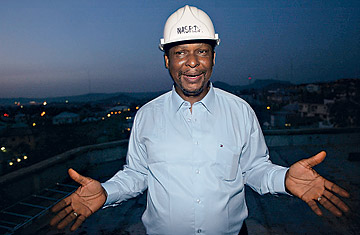
Robert Boroffice
What does launching satellites have to do with lifting Africans out of poverty? Just ask Robert Boroffice. He's the head of the space agency of Nigeria--yes, Nigeria--and he is convinced that space programs can succeed where Earth-bound projects have failed. Though blessed with vast oil reserves, Africa's most populous nation has been crippled by years of military rule and mismanagement. According to the World Bank, 70% of Nigerians live on less than $1 a day.
But three years ago Nigeria became only the second country in sub-Saharan Africa (after South Africa) to launch its own satellite. NigeriaSat-1 took off from Russia but is controlled by Nigerian scientists and engineers from a ground station in Abuja. The satellite, which was built in Britain, is part of a network called the Disaster Monitoring Constellation. Its job includes keeping an orbiting eye on Nigeria's vanishing forest resources and often vandalized oil pipelines. It also watches for impending disasters such as fires and floods and shares the information with a consortium that includes Algeria, China, Thailand, Turkey, Vietnam and Britain.
That's only the start of Boroffice's ambitious plans. A communications satellite designed to give even remote villagers access to the Internet is scheduled to be launched next year, and a second observation satellite is planned for 2009. To make the space program self-sustaining, Nigeria wants to sell excess bandwidth to other nations; a United Arab Emirates-- based company reportedly has already signed a $250 million deal. "I'm very passionate about space technology, says Boroffice, 57, a former biology professor. "I see what it has done in India, and I want to do the same in Nigeria." He is already working on plans for the first all-African satellite, with a launch window around 2025.